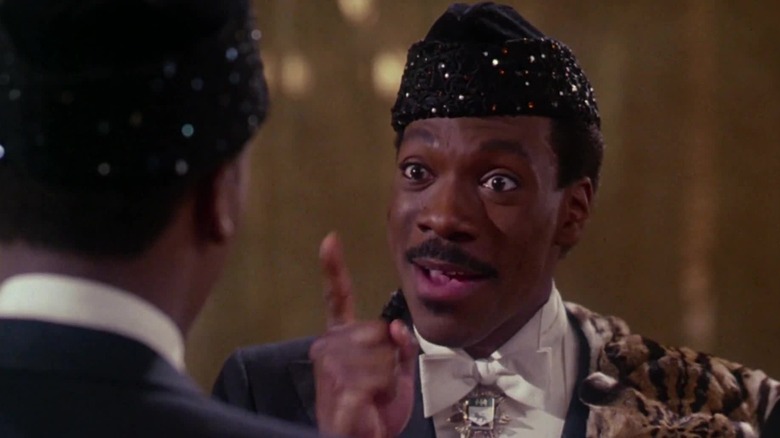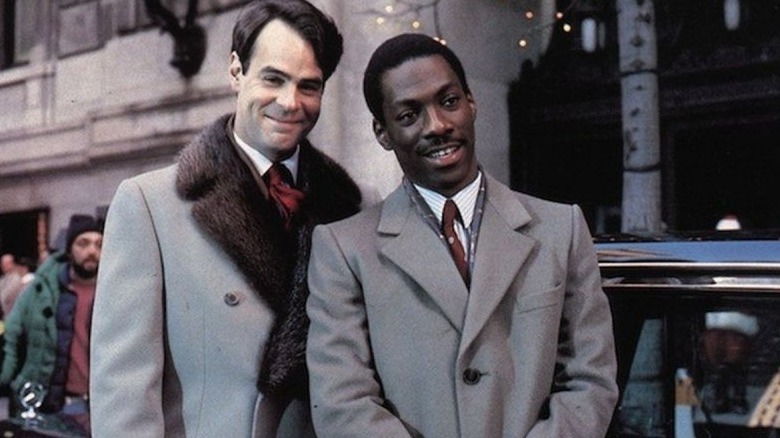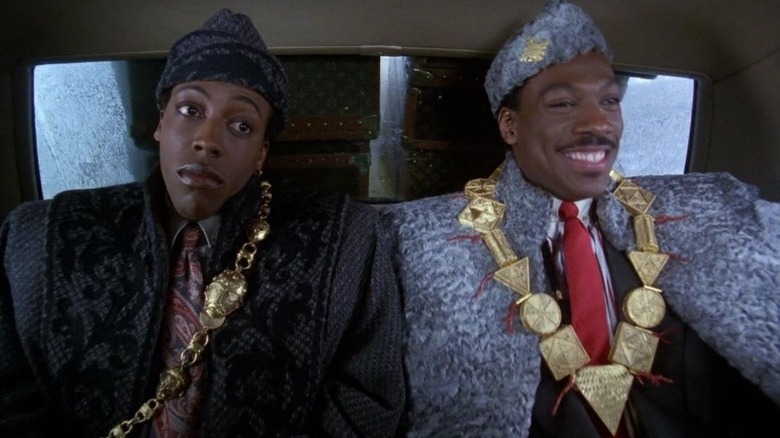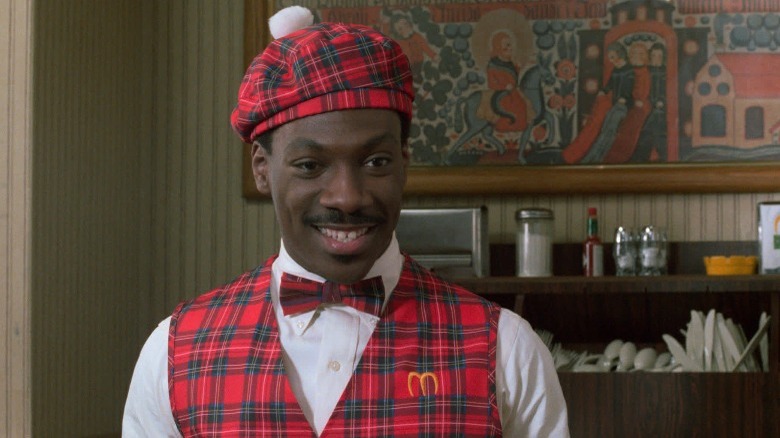Coming To America Caused A Lot Of Friction Between Eddie Murphy And John Landis
Eddie Murphy spent the 1980's rising to the top. From hitting comedy clubs as a teenager to his role in revitalizing "Saturday Night Live" to his unmissable film comedies — "Trading Places," "48 Hrs," and "Beverly Hills Cop" — he made a name for himself as one of the funniest men in show business before he'd even turned 30. His star ascended quickly, so quickly that an early collaborator would swear that he'd changed by the end of the decade.
When filmmaker John Landis first met with Murphy about playing con man Billy Ray Valentine in 1983's "Trading Places," he didn't know of Murphy's work on "SNL." Landis was impressed enough with the comedian to convince the studio to cast him, and even let him improvise while filming. Murphy was proud of those abilities, asking Rolling Stone in 1984, "If what you say is funnier than what's on paper, how could you not change the dialogue?" That confidence hinted at the future tension between the two.
By the end of the 1980's, Landis and Murphy saw their professional careers move in two entirely separate directions. Murphy became a box office king and Landis saw his career stalled by scandal. Murphy had to fight the studio to get Landis the directing job on his 1988 film "Coming to America." The difficulties between them hit a fever pitch.
Murphy's rise
In a 2013 oral history about the making of "Trading Places," director John Landis claimed that the "studio was very unhappy with almost everybody they wanted me to cast." When the movie was initially conceived, it was going to star Richard Pryor and Gene Wilder, casting a huge shadow over any other prospective stars. When you consider that Dan Aykroyd — playing moneyed clown Louis Winthorpe III — was a weak box office draw since the death of his comedy partner John Belushi, it made sense for the studio to be nervous about his co-star as well.
Coming off the buddy cop classic "48 Hrs.," Eddie Murphy's casting in "Trading Places" played a major role in his rise stardom. It led not just to funnier roles and greater comedic influence, it impacted his box office. Beyond his comedy hits, his stand-up performance film "Eddie Murphy Raw" became the highest-grossing film of its type, making $50 million. It could be said he owed a lot to "Trading Places," and in turn to Landis.
When Landis was making "Trading Places," however, he had just come off a major incident on the set of 1982's "Twilight Zone: The Movie," an anthology piece that featured four filmmakers creating their own take on the classic television show. During the filming of Landis' segment, the star (Vic Morrow) and two children (Renee Shin-Yi Chen and Myca Dinh Lee) were killed.
Murphy got Landis the directing job
Eddie Murphy didn't go to John Landis' trial for the "Twilight Zone" deaths. Instead, as he claimed in a 1990 interview for Playboy, Murphy returned the "Trading Places" favor for Landis, getting Paramount to hire him to direct "Coming to America." Murphy was originally set to direct, from a story he conceived (for which he and the studio were later sued on plagiarism charges), but he was motivated to hire Landis by the sorry slate of films his old collaborator had made since. Murphy would say, "the one fun experience I had with a director... was with Landis." But his experience on "Coming to America" would not be fun.
Whatever the reason for the clash between the two, it began immediately. As Landis told Collider in 2005, "the guy on 'Trading Places' was young and full of energy and curious and funny and fresh and great. The guy on 'Coming to America' was the pig of the world." Landis took issue with Murphy's inflated ego, and really saw it coming out in contrast to the performance Murphy gave in the movie. As Prince Akeem, Murphy plays a big-hearted, sophisticated nobleman. Not exactly a "pig of the world."
Working together again
The fighting swelled in ways that painted both men badly. John Landis only really enjoyed working with Murphy when he was covered in prosthetics, playing one of many other roles in the movie. The director clearly didn't like working with a movie star, and Murphy took note. He told Playboy in 1990 that Landis came onto the set with an attitude. Landis even warned Shari Headley, who played love interest Lisa, that Murphy was going to try to sleep with her.
In the same interview, Murphy claimed to have gotten into a slight physical altercation with Landis after the director publicly aired out some of Murphy's business details on-set. The incident left Landis running away and later confronting Murphy in his trailer, with Landis telling him he never thought he was talented. Murphy responded by darkly joking at a "Coming to America" press conference that it would be more likely for Landis to work with the late Vic Morrow than Murphy ever again.
And yet, they did work together again, on 1994's widely-derided "Beverly Hills Cop III." Landis told Collider that he wanted to make a comedy, but even if both men were less combative this time around, Murphy wasn't willing to be funny. By that point, his career had shifted too, his batting average dropping precipitously with flops like his poorly received directorial debut "Harlem Nights." Both men had exited their golden age.



